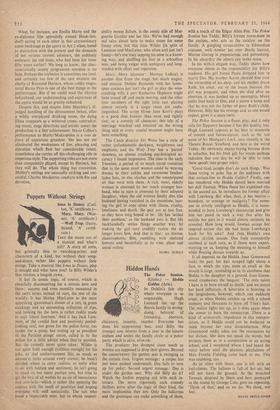Puppets Without Strings
Irma la Douce. (Carl- ton, 'X' certificate.)— Mary, Mary. (War- ner, 'A' certificate.) —Wolf Trap. (Jacey, Strand, 'A' certifi- cate.) TAKE the music out of a musical and what's left? A story of sorts, but generally thin to vanishing-point; and characters of a kind, but without their song- and-dance, rather like puppets without their strings. Take a musical like Irma la Douce, play it straight and what have you? In Billy Wilder's film version, a longish yawn.
It has its comic logic, of course, which is cheerfully disconcerting for a minute here and there: success and even morality measured in the tart's terms instead of ours, the rest of the world's. It has Shirley MacLaine as the most appetising ignoramus's dream of a tart, in green stockings and an astounding collection of zips, and looking (as the hero is rather rashly made to say) 'about fourteen.' And it has Jack Lem- mon, of the candid face and positively peeled- looking soul, too green for the police force, too, tender for a pimp, but ending up as president of the Parisian pimps' union, called in by the police for a little advice when they're puzzled. But the comedy never quite takes: Wilder is not quite bold enough (ruthless enough) for his joke, so that embarrassment (his, as much as anyone's) lurks around every corner; he hasn't decided where to carry realism, or quite what to do with fantasy and sentiment; he isn't going to tread on too many puritan toes, but tries to get the best of all worlds by an air of insouciance and ooh-la-la--which is rather like spraying the cinema with the smell of gauloises and hoping everyone will sniff ecstatically. The tart who loves a respectable man, but to whom respect- espect- ability means failure, is the comic side of Mar- guerite Gautier and her like. We've had enough sad tales about tarts to make room for some funny ones; but this time Wilder (in spite of Lemmon and MacLaine, who often are) just isn't funny—he's too busy tapping his nose in a know- ing way, and shuffling his feet in a schoolboy way, and being vulgar with ambiguity and long- winded with effort and repetition..
Mary, Mary (director: Mervyn LeRoy) is another film from the stage, but much stagier, and miscast. Debbie Reynolds with her home- spun cosiness just isn't the girl to play the wise- cracking wife, a part Katharine Hepburn might have tossed off and made moving, and the other four members of the tight little cast playing almost entirely in a single room are undis- tinguished. The script (from Jean Kerr's play) is a good deal funnier than most and rightly cast; as a comedy of character, this tale of a marriage wrecked and restored on the wrong thing said at every crucial moment might have been something.
The Czech director Jiri Weiss has a style of rather unfashionable darkness, weightiness and emphasis, and his Wolf Trap has a 'period' slowness, an almost creaking psychological ac- curacy I found impressive. The time is the early Twenties, a period of so much social transition that in the same street women could be wearing dresses to their ankles and enormous feather- laden hats, or else cloches and the emancipated air that went with them. A rich, stout, elderly woman is obsessed by her much younger hus- band, who in turn is obsessed by their adopted daughter; when the old woman finally dies (the husband having vanished in the meantime, leav- ing the girl to cope alone with illness, cruelty, loneliness and death, the pair are at last free, as they have long hoped to be: life has 'settled their problem,' as the husband puts it. But life backhandedly settles things another way, by making the girl very credibly realise she no longer loves him. And that is that: an intense, claustrophobic film, rumbling with unstated horrors and beautifully in its time, place and social milieu.
ISA BEL QUIGLY






































 Previous page
Previous page